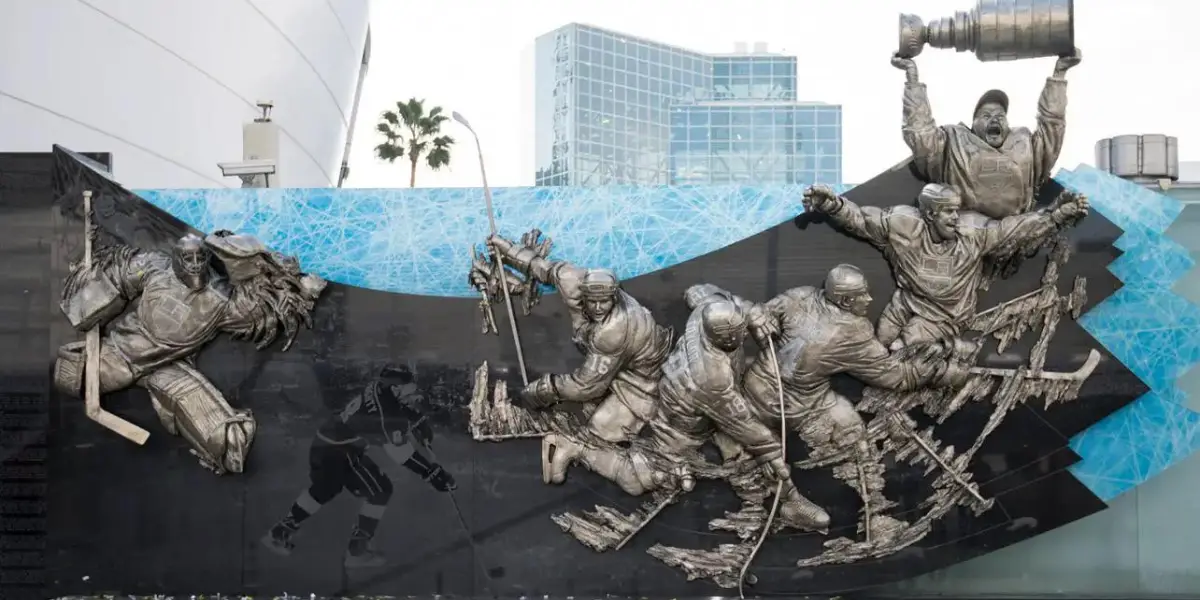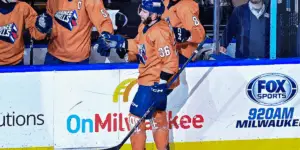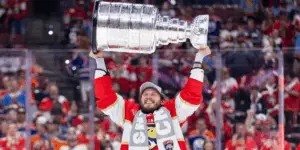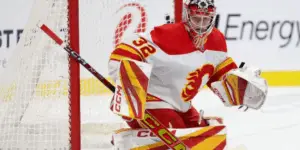
The Then
Rob Blake spent the first portion of his tenure as General Manager collecting and gathering assets while still trying to field a somewhat competitive roster. The team took steps towards what it could attain each year under Blake. After the Covid years, Rob Blake turned towards fielding a sustainable and winning team by signing Philip Danault for nothing. Montreal’s defensive, pass-first darling was off coming to a Stanley Cup final visit where he played the number one shutdown role and, at times, number one minutes as the top center. Getting Phillip Danault out of free agency should be lauded as one of the savviest moves for Rob Blake, let alone any general manager for the last decade. The move marked the turn of the tide.
He then sent two second-round picks for a volume shooter and primary assist monster to Nashville for Viktor Arvidsson. Arvidsson has been a Kings fixture on the powerplay, and a top six force that plays a reliable game. He signed Alex Edler, a savvy, grizzled veteran of the Vancouver Canucks, hoping for size and grit on the blue line in a penalty kill role for mentoring some of his young Swedish players.
Insulating the team with the new influx of Phillip Danault, Alex Edler, and Viktor Arvidsson, the Kings were going to be competitive, but making the playoffs exactly was skeptical.
The Kings would go on to shock the league and make the playoffs, mainly due to Trevor Moore’s emergence and Adrian Kempe’s breakout. The Dustin Brown retirement would signal the end of an era and was plausibly another reason they took Edmonton to seven games. The Kings won an early overtime in game five, having the chance to win the series at home. They faltered, ending the career of Brown and the last time we would see Jonathan Quick in a playoff game while wearing a Kings jersey.
The Now: Utilizing the First Round Pick
Blake made the most significant offseason swing following this first-round exit by trading his first-round pick and prospect Brock Faber for Kevin Fiala. The 2022 Kings would battle consistency issues early on, plagued by below-average goaltending, mainly due to the falling of grace of Cal Peterson. Journeyman Pheonix Copley would provide average goaltending, who initially came to the organization as a contingency plan.
The Fiala move would pay dividends while he was healthy, proving to be the player advertised in his last year in Minnesota.
Eyeing their first potential Pacific Division title, Blake surveyed the team and pulled the trigger on Joonas Korpisalo and Vladislav Gavrikov from Columbus for Quick and a first-round pick.
Unfortunately, this team could not stay healthy, with critical injuries to breakout phenom Gabriel Vilardi and a point-per-game player in Fiala. The team ultimately staggered towards the playoffs, reflecting 2016 energy. They would lose to Edmonton in six games, with their only two wins coming in overtime games. Of the Oilers’ four wins, only one came in overtime; thank you, Zack Hyman.
After two straight first-round exits to the hands of the Oilers and the sitting champion within the same division, Rob Blake swung at another massive move that will end up as his highest risk vs. reward moment of his general manager career. Pierre Luc-Dubois was acquired for Gabriel Vilardi, Alex Iafallo, Rasmus Kupari, and a second-round pick. The Kings went for size down the middle, depth, and some much-needed snarl.
The team was set by levying off the Cal Peterson contract with Sean Walker and sending Sean Durzi to Arizona to lock down Vladislav Gavrikov.
The Future
The gaping story of the future will be how the goaltending works out. The pipeline outside of Erik Portillo is not promising. Even when the Kings piled up assets during 2017-2020, they lacked prospects at the goalie position. They wrongly gave the keys to the Kingdom to Cal Peterson, the goalie of the future. The Kings now have to ride three options at goal, all over the age of thirty.
I will give Blake full credit for building a roster of players that came through savvy acquisitions, patience, and striking at the right moment. Danault, as we’ve mentioned, is one of the best free-agent signings of the last decade and instantly became a force behind Kopitar. Fiala is a point-per-game player who Blake got for a prospect and a first-round pick. Minnesota was hampered by the buyouts of Zack Parise and Ryan Suter, opening the moment for Blake to strike. Likewise, Dubois, as we’ve covered, has had two stops in the NHL with organizations that didn’t click. He wasn’t willing to resign in Winnipeg, and the Kings capitalized under Blake. The cost was high, but players at the center position, with his skill set and age, don’t come around that often. Give credit to Blake for executing a trade that I compare closely to Jack Eichel out of Buffalo, which both teams have benefitted from. Dubois is likely to be a temporary handoff of responsibility once Kopitar retires.
From these moves, many things become clear about the organization. We know the franchise is in a win-now mode, wanting to win at the highest level while Doughty and Kopitar have gas left in the tank. Kopitar’s new contract becomes clear to me that the timeframe of two years is what Blake and company have to win it all or, at a minimum, break through the first round. Both players of Hall of Fame merit, numbers to be in the rafters, and Championship culture cultivators, Doughty and Kopitar, need clear handoffs ready to take over. Brandt Clarke and Quinton Byfield are the heirs apparent, but are they two years out from taking over?
This is why it becomes clear that Blake started levying off so many assets to acquire ready talent. You get a Dubois to buy Byfield more time to grow. Even Phillip Danault acting as your third-line center, no other prospect definitively grabbed the 3C. The list of successful first-round picks the Kings drafted under Blake raises both eyebrows. Gabriel Vilardi, Rasmus Kupari, Tobias Bjornfot, Alex Turcotte, Quinton Byfield, and Brandt Clarke. Vilardi had broken out, and Kupari, playing substantial time in the NHL, was traded off. The final four remain, with Alex Turcotte’s potential at the pro level uncertain due to a massive grouping of injuries over three years. Tobias Bjornfot has not solidified himself in the lineup despite having over 100 NHL games. Blake has sold off vast portions of the farm since he can see the value for some of these players drop off each year. Blake has committed to Clarke, Byfield, and Kaliyev for now. The underlying issue is the need for prospects to take the next step towards being consistent performers, living to their draft potential.
With all their draft capital, there was still uncertainty about their prospects of living up to their potential. The injuries are undeniably unfortunate and unlucky, but their top prospects have accrued time off the ice recuperating that no other franchise can compare in the last half-decade with the amount of top talent not skating.
Blake finds himself in an intriguing position. He no longer has the vast pool of prospects to trade off for ready-now talent. He is up against the cap with three goaltenders that cause concern. He will have to rely on players within the organization that can take the next step forward. These two years will be penultimate for the fate of Rob Blake.
Required Reading:
Part II: The Transfer of Power
Discover more from Inside The Rink
Subscribe to get the latest posts sent to your email.



